About Us
- Air Cadets
- Joining
- Cadets
- Training
- Classifications
- Staff
- Committee
- FAQ
Air Cadet Organisation
.jpg)
1099 (Worsley) Squadron is part of the Air Cadet Organisation. The ACO is a national youth organisation for young men and women aged 12 - 20.
It is made up of two sections; the Air Training Corps and the Combined Cadet Force (RAF). Worsley Squadron belongs to the Air Training Corps Branch.
Air Training Corps
The Air Training Corps has 6 Regions. Each Region has control of several Wings and each Wing commands several Squadrons. Worsley Squadron along with 36 other Squadrons, belong to Greater Manchester Wing. Greater Manchester Wing is one of 5 Wings in North Region.
Squadron
The Squadron meets every Tuesday & Friday evening from 7 - 9pm at our Headquarters on Highfield Road, Little Hulton. You can visit the squadron any time and at any age. To join you must be Year 8 and above but you must join before your 17th birthday. The upper age limit to leave is 20.
Social Media
Instagram... Twitter... Facebook...
Former Members Facebook...
Contact...
Squadron Gallery...
Fitting In
.jpg)
Worsley Squadron has cadets from many different areas and schools. You will be made very welcome on your first visit and from then on you will get to know people. You could always bring a friend with you! As a cadet in this very busy squadron, you will be part of a larger organisation.
The Squadron starts from 7pm with first parade. A register is taken and cadets are informed of their various duties for the evening. There is a canteen break, where refreshments can be purchased. Around 8.30pm there is a general tidy up, followed by final parade. On final parade, future events are discussed and any awards formally presented.
Uniform
You will receive a free uniform but you will need to purchase some black socks and some shoes. Getting your uniform will also depend on how good your drill is and whether or not you can salute an Officer confidently. Don’t worry we will teach you how.
Cost
Subscriptions cost £20 per month. Activities such as Flying and Gliding are free but you will need to pay, for other special activities and courses if you wish to attend.
Contact...
Gallery...
Cadets
Once settled in, there begins the advancement through the classification syllabus. Training towards the First Class examination, gives a grounding in conduct, rank structure, drill, background of the Royal Air Force and Air Training Corps, amongst other useful subjects before moving onto the activities on offer.
Promotion
After some time and providing a level of leadership and commitment are shown, applicants are invited to submit themselves for promotion.
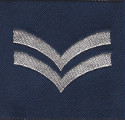
Corporal
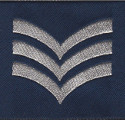
Sergeant
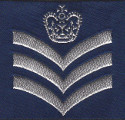
Flight Sergeant
Staff Cadets
Following the restructuring of the classification syllabus from September 2010, all cadets who are 18, irrespective of classification or rank will be known as Staff Cadets. These will be identified by wearing a staff cadet slide on their epaulettes. Cadets can stay until they are 20 irrespective of what cadet rank they achieve.
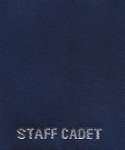
Staff Cadet
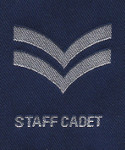
Corporal
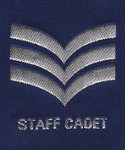
Sergeant
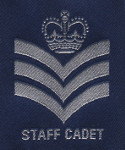
Flight Sergeant
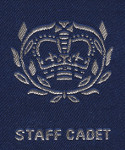
Cadet Warrant Officer
Progressive Training Syllabus
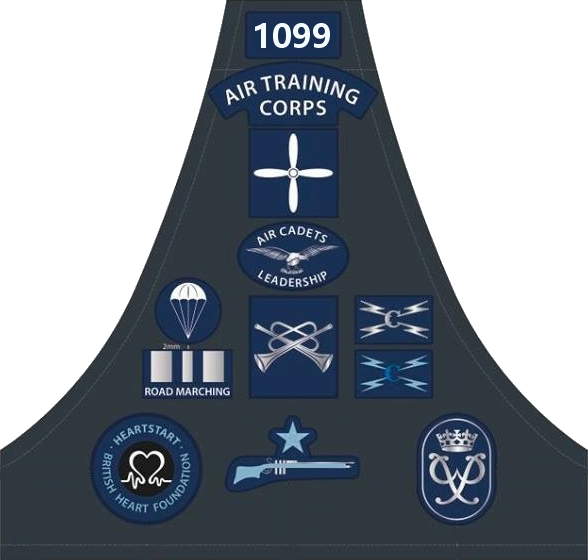
The delivery of a modern and dynamic Progressive Training Syllabus is an essential element of the RAF Air Cadets 2020 Strategy. This aims to deliver a sustainable air-minded youth organisation of choice that offers fun and challenging opportunities to young people and develops citizens with valuable skills for the future.
Progressive Training Syllabus Objectives
The new Progressive Training Syllabus has been designed to allow all cadets to engage with a wide variety of training activities from the day they join the RAF Air Cadets. Advancement through a series of progressive awards at blue, bronze, silver and gold levels aims to provide opportunities to enhance skills and achieve nationally recognised qualifications and awards, whilst at the same time, building confidence and developing teamwork and leadership qualities. All new cadets will undertake training within the First Class Cadet syllabus and this allows blue level awards and badges to be achieved in a variety of subjects including; Basic Radio Operator and Cyber Awareness, Heartstart First Aid, Foundation Level Leadership and a pre-Duke of Edinburgh’s Award. Additional badges are available for air rifle shooting and a musicians badge can be awarded if a cadet has a recognised music board examination at Grade 3 level. Flying and Gliding Aviation Training Packages are available from the age of 13 years and 3 months and blue wings will be presented once the elements of ground school, Part Task Trainer and airborne sorties are completed.
Once a blue badge has been awarded, cadets can engage in further levels of the Progressive Training Syllabus which allows them to maintain a positive level of engagement with training and provides a focus on achievement throughout their time as a cadet. The highest awards at gold level recognise significant levels of achievement and some are linked to instructor qualifications or nationally recognised awards. These include; Instructor First Aid, Cyber Specialist, National Musician, Advanced Leadership, Competition Marksman, Pilot Scholarship and gliding to solo standard.
Blue Badge Logbook
The aim of the logbook is to identify the blue level awards from the Progressive Training Syllabus that can be achieved either during First Class Cadet Training or at any other time during a cadet’s service.Transition
Existing cadets who have already achieved a badge from the old training syllabus will be eligible to receive the new equivalent badge awarded from the Progressive Training Syllabus. Cadets who have achieved a gliding badge from the old syllabus will be allowed to continue to wear this until they progress further within the Aviation Training Package. The Duke of Edinburgh’s Award badges will be smaller and will move from the jumper to the Brassard.
New badges will be made available at various stages throughout 2017. The transition from old badges to new badges should be completed by the 1st April 2018. The Progressive Training Syllabus will be available from the 5th February 2017.
Classifications
The Classification Syllabus was reformed in September 2010, starting with Junior Cadet, Second Class, with the following classifications, having badges:
First Class CadetThe following elements are included in this introduction to Cadet Training: Air Training Corps, Royal Air Force, History of Flight, Principles of Airmanship, Map Reading, Initial Expedition Training, Basic Radio Communications and Drill.
Leading CadetIntermediate training in the following subjects: Airmanship Knowledge, Principles of Flight and Basic Navigation Using Map & Compass
Senior CadetAdvanced aviation training to include 3 subjects.
Master Air CadetSpecialist aviation training to include 3 subjects not undertaken at Senior Cadet.
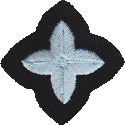
First Class
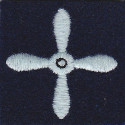
Leading
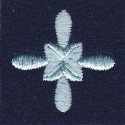
Senior
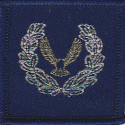
Master
These are taken over a period of years from the age of 13 or from whenever you join. Each classification requires that you pass, a series of multiple choice examinations, i.e. pick an answer A, B, C or D. This is done online with staff on hand to assist you, if required.
Instructor CadetThis trains a cadet to be able to deliver lessons to other cadets on their squadron. The cadet has to pass the Methods of Instruction Course, receiving a yellow landyard.
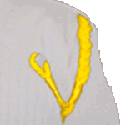
Instructor
Diploma
In addition to the above, those cadets going into year 11 of the next academic year, can apply to do the BTEC Level 2 Diploma in Teamwork & Personal Development. This is completely free and many activities that you may do, as a cadet, will qualify you for many parts of the award. With a little more effort and commitment you could qualify for the award. You have up to two years to complete the award but most cadets do it in a year. There is a work book to complete, as well as producing other documents.
You could be graded a pass, a pass with credit or a pass with distinction. Whichever level you achieve, your diploma will be equivalent to four GCSE’s at A-C level. This is a good way of getting a qualification, if you don’t think you will do well at school. It is not, however, an alternative to studying for GCSE’s.
Cadet CV
From 1st April 2008 - squadron commanders were tasked with providing the opportunity for all cadets to achieve the Air Cadet CV so that cadets have visible evidence of their achievements which is understandable to the outside world.
The achievements required to qualify are:
- Completed a minimum of 18 months enrolled service
- Gained the Duke of Edinburgh Bronze Award
- Participated in a residential activity
- Completed a range detail with the .22 or air rifle
- Flown in an RAF aircraft or glider
- Passed the Leading Cadet Syllabus
A certificate is awarded to eligible cadets.
Staff
The staff comprises of uniform and non uniform staff. The uniformed staff are divided into commissioned and non-commissioned officers.
They are assisted by civilian instructors and a Squadron Padre.
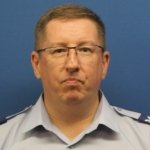
Sergeant
Steve Everett
Reverend
Hiliary Brunyee
Mr Jacob Beaver
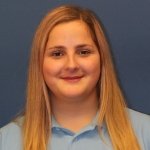
Miss Grace Leather

Mr James MacDonald

Mr Joe Morrell
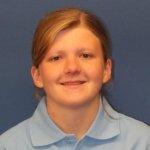
Miss Katie Morrell

Mr Lewis Topping
Civilian Instructors
Civilian Committee
The Civilian Welfare Committee exists to ensure that a squadron is ran efficiently and as effective as possible. A good liaison between the Squadron Commander and it's staff is essential. This ensures that cadets in each squadron, get the maximum possible opportunity, to experience the many varied activities on offer.
National activities like flying and gliding, are the same with every squadron but local activities will depend on the qualifications and experience of each staff member. The committee partly exists, to develop the finances to purchase equipment for the many diverse activities. It also supports the Squadron on any activity days, behind the scenes to ensure that cadets and their guests are catered for with refreshments.
Several members of the current committee have stayed to support the Squadron, long after their own children have left for their careers. We always welcome support from the parents and guardians of our current cadets.
The Squadron Chairman, Mrs Deidre Joyce attends the squadron regularly and is available to chat to any parents, guardians, former cadets etc who may be interested in supporting us via the committee. On average, the committee meet every 6 - 8 weeks at the Squadron Headquarters. Pop in if you require any further information.

Squadron Chairman
Mrs Deidre Joyce
Squadron Treasurer
Mr Ged Bithel
How much does it cost?
At the moment subscriptions are £20 per month. You will be given a free uniform on loan whilst you are a cadet. You will need to purchase some black socks and some black shoes. There are extra-curricula activities that you will need to pay for as they come up.
Do I have to join the Royal Air Force?
Not at all. Although we are heavily sponsored by the Royal Air Force, there is no obligation to join this or any other armed service. If however, you do want to join in the future, being a cadet gives you an advantage.
For more on the Royal Air Force...
Do I have to participate in everything?
1099 Squadron is extremely busy and offers many courses and qualifications, that many other squadrons do not offer. It is in your own interests to participate in as much as you can. You do not have to be super fit, all we ask is that you try your best and participate with enthusiasm!